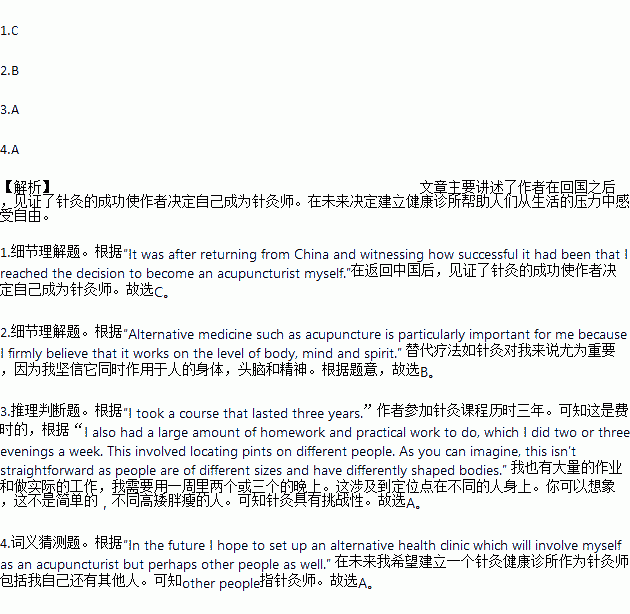题目内容
While I was teaching in China, I became interested in acupuncture(针灸). It was after returning from China and witnessing how successful it had been that I reached the decision to become an acupuncturist myself. I was lucky to discover that the town where I lived had a famous college of traditional acupuncture.
Alternative medicine such as acupuncture is particularly important for me because I firmly believe that it works on the level of body, mind and spirit. This is very different from Western medicine which is supposed to work only on the body. When a person is ill, it is believed that there’s something in their life that is putting their energy levels out of balance. What alternative therapies(疗法)try do to is kelp to gradually push that energy back into balance. The result is that any disease present might naturally disappear as it cannot survive when energies are balanced.
I’ve treated a wide range of people for various conditions, for example people suffering from stress and anxiety. To acquire a qualification in acupuncture, I took a course that lasted three years. I had to go to the college about one weekend in three. I also had a large amount of homework and practical work to do, which I did two or three evenings a week. This involved locating pints on different people. As you can imagine, this isn’t straightforward as people are of different sizes and have differently shaped bodies.
In the future I hope to set up an alternative health clinic which will involve myself as an acupuncturist but perhaps other people as well. I’d like to work with people who provide treatments such as rubbing(按摩)and pressing people’s feet in a special way to help them relax and feel well. I’d like to set it up somewhere in the countryside, where people could feel free from the stress of life.
1.The author decides to learn acupuncture .
A. when he was teaching in China
B. when he was studying in college
C. after he came back to his mother country
D. after he discovered an acupuncture school
2.What does the author think of acupuncture?
A. It prevents disease.
B. It treats people as a whole.
C. It has an immediate effect.
D. It helps improve people’s lives.
3.The acupuncture course the author took was .
A. time-consuming and challenging
B. learner-centered and effective
C. difficult but interesting
D. painful but helpful
4.What do the underlined words “other people” in the last paragraph refer to?
A. Other acupuncturists.
B. Other alternative therapists.
C. Other doctors who use Western medicine.
D. Other people who want to escape fro stress.

